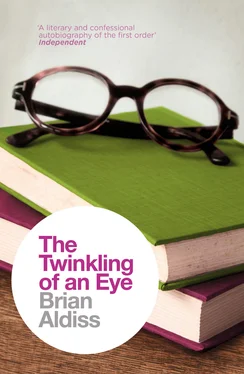And supposing it had been six months. The exile seemed to stretch for ever throughout boyhood, parching it like a bitter wind. Nothing grew. At night I lay awake, mute, alone.
The woman still lay in her rumpled bed, grinning as she held aloft a screaming child.
At last I had been replaced.
On that last day of April, snatched from home, I was simply stunned. I recall Bill’s hasty leave-taking, as he deposited me with Grandma and Uncle Bert at Brinkdale and then turned back for home and his wife and new child.
Here we are again, happy as can be—
All good pals and jolly good companee …
It was one of uncle’s many snatches of song he liked to sing on any suitable occasion. And how well he and Grandma looked after me in those weeks.
And how ill I was. The chest X-ray showed no complications. The doctor held up the misty mysterious plate, where for the first time I could look into the seemingly empty interiors of myself, or at any rate of a person resembling a ghostly mummy. There I saw a section of my skeleton, waiting patiently for its true birthday in three score and ten years’ time, when it would emerge from entombment in the flesh.
In the year that H. G. Wells’ The Time Machine was published in London, a paper was published in the city of Würzburg by Wilhelm Roentgen, entitled ‘Uber eine neue Art von Strahlen’. The new rays were X-rays. The ghostly outlines of Frau Roentgen’s hand may still be seen, complete with a ring on one bony finger. The plate is as precious an artifact, in its way, as the great Tiepolo ceiling adorning Würzburg Residenz. The human body, resplendent in the vision of the Venetian artist, garbed in fine raiment, has become transparent, without colour, shadowy, permeable.
And shadowy and permeable I felt. My illness was not merely physical. It was the illness of a child, in Bowlby’s words, crippled.
No teddy bear ever accompanied me to bed. Instead, a golliwog called Peter played sentry to my soul through the night watches. Peter was an invention of Dot’s. He was black because he was constructed of the tops of one of the maid’s cast-off black stockings.
Peter’s soggy shape was clothed in garments Dot knitted or made up from pieces of felt. Two linen buttons such as served in the 1920s to secure underpants were used as Peter’s blind, staring eyes. The mouth was a curve of green wool, the hair a startling red crew cut. Small wonder I have had a taste for the macabre ever since!
And the first night I was tucked between Grandma’s sheets in a small feather bed, sick and homesick, I whooped and vomited all over Peter.
My faithful golliwog was taken away and destroyed.
My cousins Peggy and John sometimes waved to me on their way to school, as I watched through the window. They were allowed no nearer for fear of infection. Peggy’s sweet round smiling face was something to be looked for. When I ceased to be infectious, this dear cousin would take me by the hand and lead me about Peterborough. I never knew her other than gentle. Yet there was a shadow over her and her brother John’s life: their mother, May Wilson (née Schofield), had died a year or two earlier of tuberculosis.
A compound of illness and remorse, I had been sent away, unwanted boy child, as soon as the girl child had arrived. I had much offended in ways beyond my comprehension. My mood was one of self-abnegation – and yet I could not help throwing up all over Granny’s house.
I was not getting better. The doctor came again. The sticky medicine I had been given – ‘A Tablespoonful at Bedtime’ – had completed the work begun by Callard & Bowser’s Mint Humbugs. My milk teeth were rotting and would have to come out.
Uncle Bert took me to his dentist. The dentist produced a sort of dunce’s cap made of flannel, which he soaked in chloroform. Instructing me to count to a hundred, he placed the cap over my face. I looked up into it and began to count … and when I woke, twelve of my teeth had been extracted. Uncle carried me back to the car in his arms. A limp and gummy sight I was.
Although I wanted to die in peace, the life force of which George Bernard Shaw spoke so highly asserted itself. I sat up in Grandma’s narrow front room, surrounded by framed photographs of my grandfather’s champion pigeons and the certificates they had won, and ate a little white fish for supper, garnished with fresh blood.
One consolation of living with Grandma was access to ‘the Fireby-Wireby Book’. This was the name I gave, at a very early age, to A. Moreland’s Humors of History: 160 Drawings in Color .
Despite the spellings, the book was entirely English. As the title page states, the pictures were ‘Reproduced from originals from the Morning Leader ’. Its ferocious drawings depict scenes from British history, larded with anachronisms.
My devotion to this book – and Grandma’s copy has sailed through the storms of time to be with me to the end – must have been inspired by the sinister aspect of the characters depicted. People are forever having their eyes poked out or being poisoned. Henry I dies of a surfeit of lampreys, his agony well illustrated, while the butler looking on can barely suppress a snigger. A marvellous book indeed, calculated to nip in the bud any hope of being sentimental about the past of our glorious isle.
Grandma Wilson presided over a Victorian house. She preserved in it Victorian ways; she must have been born at about the time of the Great Exhibition. Her tastes had set in concrete, or at least gutta-percha, at that time.
Monday was a very uncomfortable day, when a puritanical purging of dirt took place. I felt in danger of purgation too. Grandma employed a fearsome washerwoman of square shoulders and square everythings who set to work with a dolly and tub to beat garments into a pulp, before stringing them up in the garden on a line like so many drowned criminals.
Everything about the house that could be elaborate was elaborate. One sat in the lavatory on a toilet encased in mahogany with a lever to one side, resembling a Jules Verne ejector seat in a giant airship. The bath, similarly encased, had a grill like a set of gnashed teeth into which water was sucked with agonised noises, like Brown Windsor soup through a moustache.
Furniture in sitting and living room was designed to intimidate. Most of it was carved wherever carving was possible, reminiscent of the Cattermole engravings in Dickens’ Barnaby Rudge , which my uncle Ernie used to read to me.
The flimsiest furniture was in the drawing room, where antimacassars were the rule. Expressly designed to counteract childhood was a freestanding china cabinet on spindly legs. It contained dozens of small white china souvenirs. To venture within a yard of it was to awaken cries of ‘Mind out!’, or even ‘Mind out, now!’, as though one had not minded out only the day before.
Family photo albums with dangling tassels were stowed in a revolving bookcase. A snarling fox, lifelike feat of taxidermy, stood above the door in its glass case, ever threatening small boys that it might jump out and attack them.
All light switches protruded like brass replicas of Hottentot breasts. They were tipped with little vague levers for nipples; instead of the customary brisk On-Off of normal electrical equipment, they featured a Yes-No-or-Maybe function.
A large blacklead grate dominated the breakfast room. The coals imprisoned there glowed with resentment. In the cellar, smelling of damp muslin and pulped mushrooms, hung some of the fruits of Grandma’s labours. She was an industrious little woman, an over-baker by conviction, so that she could distribute cakes, concealed beneath tea cloths, to poor relations dotted about town, in the Dogsthorpe Road and elsewhere.
Читать дальше












